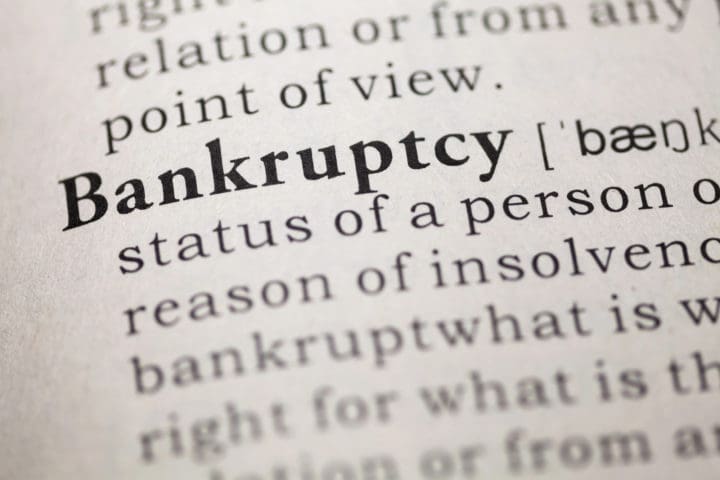7 Things That Happen When You Declare Bankruptcy
Are you thinking about whether or not to declare bankruptcy? It can be intimidating to think about, but sometimes, bankruptcy is your best option to get out of debt. Despite this, it can still be frightening to think about. This article will walk you through what happens when you file for bankruptcy.

Image from Depositphotos
What Happens When You File Bankruptcy?
When you declare bankruptcy, you are asking the bankruptcy court to eliminate debts that you cannot pay. Depending on the debts you owe and the type of bankruptcy you file, there could be a few debts you cannot discharge. However, when you declare bankruptcy, you can get rid of most unsecured debts to get the fresh start you need to recover from the financial crisis that resulted in your debt problems.
Many people who filed Chapter 7 bankruptcy in the past often wonder if they can file another Chapter 7 before 8 years after their first Chapter 7 filing.
Five things that happen when you declare bankruptcy include:
1. Determine Whether To Hire An Attorney
Thankfully, most bankruptcy attorneys provide a free consultation, so you can understand whether a bankruptcy attorney is a right fit for you. It can be helpful to understand the implications of filing bankruptcy without an attorney.
When we started writing articles, we received numerous requests to pair people up with local, reputable bankruptcy attorneys as reviews online can be biased. As such, we came up with the 5 R's criteria that we follow to recommend bankruptcy attorneys.
- Referral
- Reviews
- Relevancy
- Rates
- Reliability
One of the important components is the rate they charge. While bankruptcy attorneys provide free consultations, they do not often provide their services for free (as they are a business).
So, what is the cost of filing? This was a common question, so we went through thousands of points of data to provide the attorney fee estimate calculator below that is based on your zip code.
Why You May Want to Hire An Accident Attorney
2. Determine Which Chapter to File
The most common types of consumer bankruptcies are Chapter 7 and Chapter 13. Each type of bankruptcy has its own list of pros and cons, so is it better to file Chapter 7 or Chapter 13. There are numerous things to consider, so we did want to make it easier by building a free Chapter 7 vs Chapter 13 bankruptcy, which is based on the bankruptcy forms. Understanding the various benefits and consequences of these kinds of bankruptcies can help you make the decision for your specific situation.
3. Bankruptcy Automatic Stay
The automatic stay provided in the Bankruptcy Code is effective upon the filing of a bankruptcy petition and continues until the stay is modified or the bankruptcy case closes. There are some instances in which the bankruptcy stay may not go into effect automatically, as in the case of multiple bankruptcy filings or dismissals of prior bankruptcy cases. A debtor might need to petition the court requesting protection from the bankruptcy stay in those cases.
The bankruptcy stay protects debtors from further collection of debt by creditors. It gives debtors the time they need to reorganize their debts in Chapter 13 or seek bankruptcy relief in Chapter 7. The Bankruptcy Code prohibits parties from taking any actions to collect a debt without prior approval from a bankruptcy judge.
4. You Must Complete Your Debtor Education Course
There are two required bankruptcy courses debtors must complete before receiving their bankruptcy discharge. Before you declare bankruptcy, you must complete a credit counseling course. After you declare bankruptcy, you must complete a debtor education course.
You take the second bankruptcy course after filing the bankruptcy petition. The deadline for completing the debtor education course and filing a certificate of completion depends on which chapter of bankruptcy you file. It is usually best to complete the debtor education course and file your certificate of completion before the First Meeting of Creditors to avoid forgetting about this requirement. If you do not complete the course or fail to file a certificate of completion, you do not receive a bankruptcy discharge.
Side Hustles to Pay Off Debt
5. Attend the First Meeting of Creditors
All debtors in bankruptcy are required to attend the First Meeting of Creditors or 341 Meeting. The bankruptcy court schedules the 341 Meeting after you declare bankruptcy. The hearing is usually held within a few weeks after filing a bankruptcy petition.
The bankruptcy trustee assigned to your case conducts the First Meeting of Creditors. There is not a bankruptcy judge present. You are required to answer questions about your bankruptcy case and finances under oath. In most cases, creditors do not show up to this hearing.
6. Propose a Chapter 13 Repayment Plan (if you pursue Chapter 13)
If you file a Chapter 13 case, you must also file a proposed Chapter 13 repayment plan after you declare bankruptcy. The Chapter 13 plan describes how you intend to reorganize your debts in bankruptcy. All creditors and parties in interest, including the Chapter 13 trustee, receive a copy of the Chapter 13 plan.
A bankruptcy judge holds a confirmation hearing to approve or deny the proposed Chapter 13 plan. If the Chapter 13 trustee, the court, or a creditor objects to the proposed bankruptcy plan, your bankruptcy attorney can typically amend the plan to resolve the objection.
6 Tips to Raising Kids who Value Money
7. Receive Your Bankruptcy Discharge
If you meet the requirements and do everything required by the Bankruptcy Code, the court issues a bankruptcy discharge before your bankruptcy case is closed. The bankruptcy discharge releases you from the legal liability to repay the debts discharged through your bankruptcy case.
Most unsecured debts are eligible for a discharge in Chapter 7 and Chapter 13.
Examples of dischargeable debts include:
- Credit card bills
- Medical debts
- Old rent or lease payments
- Most old income tax debt
- Some student loan debts
- Old utility payments
- Most personal loans and judgments
To determine which debts are dischargeable in bankruptcy, you should consult an experienced bankruptcy lawyer.
Should you file for bankruptcy?
Filing a bankruptcy case might be the best way for you to get out from underneath your pile of debt. However, you might also have other debt-relief options available. In some cases, an alternative to bankruptcy might be a better way to eliminate debts. Be sure to also understand the bankruptcy costs that come with filing bankruptcy.
14 Smart Ways to Cut the Cost of Living




